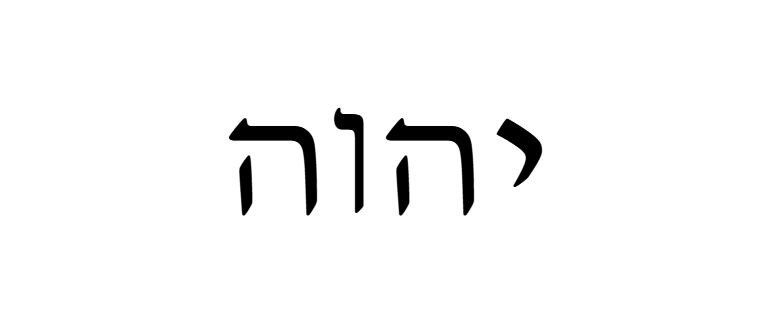The name
In “The name” Jefferson Vann explains his reasoning behind how he treats the tetragrammaton – the four letter name of God (יהוה) in the Hebrew Bible.
There is a very long history of hiding the divine name in the Bible – for several reasons. One reason is that we are not absolutely sure how the name is pronounced.
Another is that many feel that substituting the pronounced name of God is a way of preventing people from taking the name in vain.
The Hebrew Bible uses the four letter name of God (יהוה) about 7000 times. But the vowel pointing in those uses suggests that the massoretic scribes intended for some other word to be pronounced as the name was read. The name would be footnoted, and the reader would read another word out loud.
When the Hebrew Bible was translated into Greek – the Septuagint translators picked up on that suggestion and usually rendered the name as Κύριος, the Greek word for "Lord."
Consequently, many English translations substitute the word Lord or LORD or LORD (with ORD in small caps) for the name of God.
But it gets messy. For example, when the scribes intended readers to read “Lord” and indicated this intention by substituting the vowels for the Hebrew word Lord – adonay (אֲדֹנָי) in the text. When the scribes placed the vowels for adonai with the consonants of the tetragrammaton, the result was יְהוָ֥ה – which resulted in a new name for God in English – Jehovah.
Sorry, Witnesses. Jehovah was never intended to be pronounced the way it was written. It is not the correct rendering of the name of God.
Also, the massoretic scribes sometimes suggested another substitute word – like elohim, the word for God. This was true particularly if the ordinary word adonay was already present in the verse.
Let’s look at what some modern translations do with the name. I will use its occurrence in Psalm 97:1 for comparison purposes:
LORD (with ORD in small caps) – God’s Word Translation, English Standard Version, Good News Translation, Holman Christian Standard Bible, International Standard Version, Modern English Version, New American Standard Bible, New Century Version, New English Translation, New International Version, New Living Translation.
LORD – Jubilee Bible 2000.
The Lord – New Life Version, Wycliffe Bible.
ADONAI – Tree of Life Version.
Yahweh – Lexham English Bible, Names of God Bible, The Passion Translation, World English Bible.
Jehovah – Living Bible.
GOD – The Message.
The Eternal – The Voice.
I had a lot of options when I was considering how I would render the tetragrammaton in my personal translation. I could take three general approaches.
I could either substitute a version of the word the massoretic scribes intended to be read. That would result in a version of Lord or its Hebrew equivalent – adonay.
Or, I could come up with a general term that suggested divinity but was not tied to the scribal tradition. That would result in something like GOD or The Eternal.
Or, I could transliterate. This is what I chose to do. But I had problems with Yahweh, even though it is the transliteration for the tetragrammaton most suggested by scholars. My problem was that when I learned modern Hebrew, I was taught that the Hebrew letter vav is not pronounced like a w. It is a v.
I decided to render the tetragrammaton consistently in my translation as Yahveh. My concern was finding a term that best reflected what is actually there in the text.
If somebody out there has a better option, I would love to hear your opinion. If you change my mind, it will only mean about 7000 edits to my translation documents. Piece of cake.

